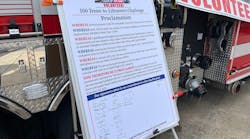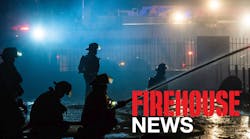George Bernard Shaw once said, "Give a man health and a course to steer, and he'll never stop to trouble about whether he's happy or not."
Great leaders instill a strong sense of purpose in people. In organizational settings, this includes communicating the overall purpose of the organization. It also extends to making a connection between daily tasks and the purpose of those tasks. Many managers and leaders don't take the time and energy necessary to convey the purpose of the work being performed. In the fire service, it is often assumed that every firefighter understands the overall purpose of protecting life and property. But what about the purpose of living out the core values of the department and cultivating future leaders? I don't see this stressed nearly as often.
In some cases where leaders do communicate more purpose and core values, they often do it in a mission or vision statement that hangs on a wall. Rookies are often given a copy of this or expected to read it as they pass it in a hallway at the station. An assumption is often made that employees should see, recognize and remember the purpose of the organization and the work that is performed. People fail to realize how little people actually pay attention unless something is brought to their attention.
Thousands of people walk through a certain Metro station in Washington, DC, every day. One morning, a man started to play the violin as people hurried by. This man played six different Bach pieces for about 45 minutes. Most people rushed past the violin player, paying no attention. A middle-aged man stopped for a moment to listen and then went on his way. After about four minutes of playing, a woman threw him his first tip: one dollar. Minutes later, a man leaned against the wall and listened for a short time before hurrying away. Every time a child walked by, the child tried to stop and listen. Every single parent refused to stop and forced the child to continue on. People walked past the violin player, barely noticing his presence.
In the 45 minutes the musician played the violin, only six people stopped and listened for a short time. Approximately 20 people gave him tips, but continued to walk without stopping. A total of $32 was given to this man while he played.
When he finished playing, no one noticed the music had stopped. No one stopped to applaud his performance. No one cared. Would their response have been different if someone had pointed out to them that the violinist was Joshua Bell, one of the best musicians in the world? Would they have been stunned to know that Joshua Bell was sitting in their Metro station playing one of the most complex pieces ever composed on a violin that was valued at over $3.5 million?
Organized by the Washington Post, this was a social experiment about the perceptions and priorities of people. Joshua Bell played incognito to determine whether people are able to recognize talent in an unexpected context. As it turns out, people could not perceive, appreciate or recognize the level of talent before them without having someone open their eyes to the depth of what they were seeing and hearing. Journalist Gene Weingarten earned a Pulitzer Prize for his analysis of the experiment and the role context plays in our artistic perceptions.
I would argue that people are often too busy and too distracted to recognize the purposes they need to fulfill in the fire service beyond emergency calls. The future effectiveness of public service depends upon leaders who can instill a purpose in others for embracing true leadership. The future depends on leaders who inspire others to want to be better leaders themselves.
The fire service is filled with burned-out firefighters who don't need another strategic plan thrown at them. Firefighters don't need another mission statement hung on a wall. They need inspirational leaders who will have the tough conversations with them. They need leaders who will remind them of why they got into this profession in the first place. They need leaders who will stop addressing symptoms and get to the cause of the problems. They need better role models to follow up, down and across the chain of command. Will you be the one to step up?
KIMBERLY ALYN, Ph.D., is a best-selling author and an international fire service speaker. She is the owner of Fire Presentations (www.firepresentations.com), a company dedicated to keynote presentations and training workshops for the fire service. Dr. Alyn has conducted the largest known fire service study on the topic of leadership and works with fire departments across the country on firefighter and officer development. She is the author of 10 books and a variety of CD/DVD productions. Dr. Alyn holds a bachelor's degree in management, a master's degree in organizational management and a doctorate degree in management with a specialty in leadership. Dr. Alyn can be reached at 800-821-8116 or [email protected].





